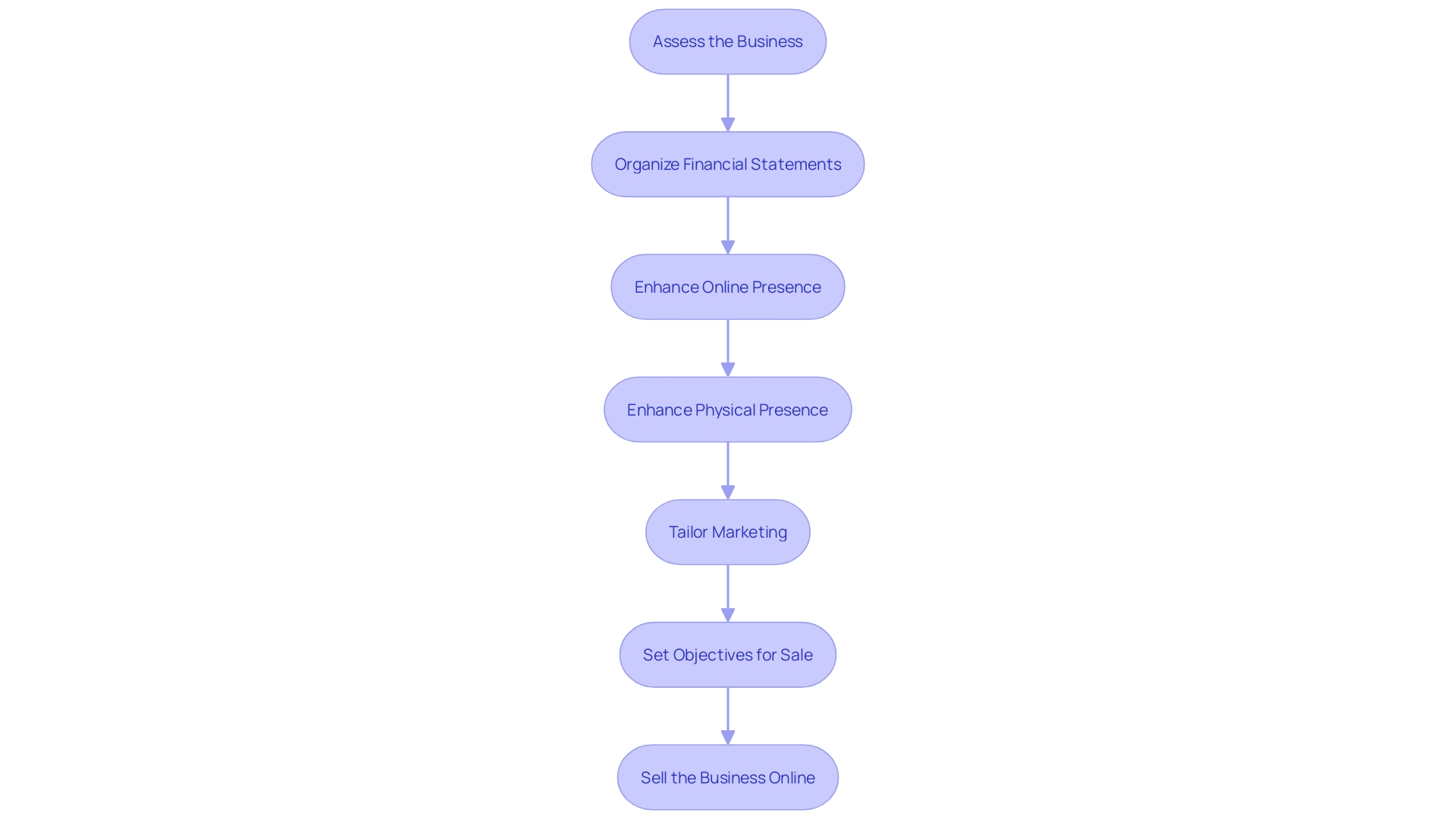Introduction
When it comes to selling your small business, preparation is key. To ensure a successful sale, you need to meticulously organize and present your venture in the best possible light. From assessing your business comprehensively to enhancing your online and physical presence, every step you take can make a significant difference.
Financial transparency, knowing your target audience, and setting concrete objectives are also crucial factors to consider. By adopting a strategic approach, you can transform your small business into a valuable asset that attracts potential buyers and leads to a successful sale. So, let's dive into the world of selling your small business and explore the steps you need to take for a seamless and rewarding journey.
Preparation Steps for Selling Your Small Business
When preparing to sell your small business online, it's imperative to meticulously organize and present your venture in the best possible light. Begin by assessing your business comprehensively, pinpointing its competitive edge in the market. This self-evaluation not only aids in accurately valuing your business but also sets a foundation for realistic expectations during the sale.
Financial transparency is key, so ensure all financial statements are accurate and readily available. Profit and loss accounts, balance sheets, and tax filings must be orderly, as savvy buyers will meticulously scrutinize these to gauge your business's fiscal health.
A polished presentation can make a world of difference. Just as Tech Ladies founder Allison Esposito Medina transformed a modest meetup into a multimillion-dollar acquisition, your business's online and physical presence should be impeccable. Declutter, enhance your website, and keep all equipment in prime condition to attract potential buyers.
Know your audience. Tailor your marketing to appeal directly to the buyers most likely to be interested in your unique business, just as specialized reports provide in-depth analysis for niche markets.
Lastly, set concrete, achievable objectives for your business's sale. Factors to consider include the sale timeline, the minimum price you're willing to accept, and any specific terms that are non-negotiable. By establishing these goals, you're not only preparing for a successful sale but also aligning with the methods used by business owners who have seen significant returns on their sales.
Remember, preparation is paramount, and adopting a strategic approach is what transformed small meetups into large-scale acquisitions, and careful financial planning into substantial capital gains. Your journey to a successful sale begins here.

Understanding Your Business Valuation
When you're ready to put your small business on the market, knowing its true worth is foundational for setting a competitive and realistic price. Begin with a thorough financial assessment, examining your revenue streams, expenditures, and overall profitability to gauge the business's financial health and market value. Look to similar business sales and current industry trends to understand how your company compares in the market landscape.
Consideration should also be extended to whether you're eyeing a stock sale—where buyers purchase your business's shares—or an asset sale, which involves selling company assets like equipment or property. Each has distinct tax implications and can affect your capital gains. Remember that capital gains are the profits from your investment; they are influenced by several factors, including improvements you've made and the equipment's depreciation.
Furthermore, the importance of key personnel in determining your business's value cannot be overstated. From the innovative minds at the top to the indispensable specialists within the ranks, every team member can impact the valuation. Reflect on the intrinsic value of your business, looking beyond mere financials to the intangible assets and growth potential that make your venture unique.
To ensure precision in your valuation, seeking professional expertise can be invaluable. A seasoned business valuation expert can provide an objective analysis of your business, taking into account market conditions, industry forecasts, and the potential for future growth. With their insight, you can navigate the complex terrain of business valuation with greater confidence and accuracy, ensuring you set an attractive and fair asking price for prospective buyers.
Choosing the Right Sales Channel
Choosing the optimal online platform or website to sell your small business is a pivotal decision that can significantly influence your ability to connect with the right buyer and secure a successful sale. Here are some key considerations:
-
Target Audience: A thorough investigation of various platforms will reveal where your ideal buyers are most likely to engage. Tailor your choice to ensure your business listing is seen by those with a keen interest in what you're offering.
-
Industry Focus: Some platforms cater specifically to certain sectors or business models. If there's a niche marketplace that aligns with your business type, it could offer a more targeted approach.
-
User Experience: The ease with which you and potential buyers can navigate a platform is essential. Opt for a platform that provides a straightforward and enjoyable experience for all users.
-
Reputation and Reliability: Opt for platforms with proven success in facilitating business sales and positive feedback from their community. A history of satisfied customers and successful transactions is a testament to a platform's trustworthiness.
When considering these factors, platforms like BizBuySell stand out due to their extensive range of businesses and franchise opportunities. The platform's reputation for being the largest online marketplace for business sales offers sellers confidence in its ability to reach a wide audience.
In addition, the current market conditions, as reported by Fiserv, suggest a favorable environment for selling consumer-focused businesses. The resilience shown by small businesses, despite economic shifts, presents an optimistic scenario for sellers.
Moreover, drawing inspiration from success stories like Tesla and Google, which started as mere ideas and grew into industry leaders, can reassure you that with the right strategy and platform, selling your online business or e-commerce venture can be a transformative step towards your next success.
Remember, selling your business isn't just about listing it; it's about presenting it in a marketplace that resonates with potential buyers, simplifying the process for both parties, and aligning with a platform that enjoys a strong reputation. By weighing these factors, you'll be well-equipped to choose the best platform to sell your small business and embark on your next entrepreneurial journey.
Preparing Your Business for Sale
When it comes time to sell your small business, a strategic approach can make all the difference in attracting the right buyer and securing the best deal. Begin by giving your business a facelift: a spotless, well-organized workspace speaks volumes about your attention to detail and can significantly elevate the perceived value of your enterprise. Enhancing the exterior look with repairs and a fresh coat of paint can also make a strong first impression, boosting curb appeal and, potentially, the sale price.
Financial transparency is key. Updated, accurate records of your income, expenses, and assets demonstrate credibility and can streamline the sale process. Moreover, a trained and committed team is invaluable.
Buyers look for a workforce that's capable and passionate, as it's a sign of business continuity and potential for growth.
Don't underestimate the importance of a transition plan. Outlining operations during and after the sale reassures buyers of a seamless changeover. Remember, as Stephanie Wells from Formidable Forms emphasizes, understanding your business's future trajectory is crucial in evaluating offers.
In addition, it's vital to avoid common pitfalls such as inadequate business valuation. As noted by experts, guessing your business's worth can either under value your life's work or deter buyers with inflated prices. Enlisting a valuation professional ensures you have a realistic, market-informed figure to negotiate with confidence.
Furthermore, consider the sale structure carefully. The decision between a stock sale and an asset sale affects tax implications and profit. For instance, a capital gain arises if your business sells for more than its initial cost plus investments, and how this gain is taxed depends on whether it's a stock or asset transaction.
Lastly, keep abreast of platforms like BizBuySell, the largest online marketplace for businesses, to understand current trends and opportunities in business sales. By taking these steps, you'll not only enhance your business's marketability but also position yourself for a successful and rewarding exit.
Common Mistakes to Avoid When Selling Your Business
When selling a small business or ecommerce venture online, sidestepping common missteps can pave the way for a smoother transaction. To begin, market research should not be overlooked. It's the cornerstone of setting a realistic price for your business.
Without it, you risk overpricing and alienating potential buyers. Islam Gouda, a marketing scholar, emphasizes the importance of understanding customer needs and preferences when determining a fair market value.
Preparation is another critical step often missed. A well-organized, clean business with updated financial records is more appealing and can significantly boost its perceived value. Reflect on the advice of business magnate Mark Cuban, who stresses the importance of thorough preparation and understanding every facet of your business before taking it to market.
Marketing your business effectively is equally crucial. Insufficient marketing can lead to limited exposure, minimizing the pool of potential buyers. Consider where your target market spends their time and focus your marketing efforts on those platforms to ensure your business is seen by the right eyes.
Clear, prompt communication with interested buyers is vital in building trust. As Cuban suggests, selling is akin to explaining the benefits of a decision—sales skills are communication skills. Ensuring that your business records are accurate and transparent can prevent surprises during the due diligence process, making the sale more likely to proceed without hiccups.
Lastly, awareness of funding opportunities can provide additional support while selling your business. Grants, such as those available in the beauty industry or post-natural disaster recovery aids, can provide the financial backing needed for a successful transition.
By acknowledging these key elements—market research, preparation, targeted marketing, effective communication, and financial support options—you can navigate the complexities of selling your online business with confidence, leading to a successful and profitable outcome.
Communicating Effectively with Potential Buyers
When engaging with potential buyers, it is essential to communicate effectively, as this forms the foundation of trust and can mean the difference between a sale or a missed opportunity. Here's how to make every interaction count:
- Respond Promptly: Time is of the essence. Address inquiries quickly to show your commitment and keep the momentum going. A swift response can capture a buyer's attention and set the stage for a successful transaction.
- Accuracy is Non-Negotiable: Transparency is the cornerstone of trust. Furnish accurate details about your business, and be open to sharing documentation. This honesty not only builds trust but also demonstrates the integrity of your operation.
- Showcase the Highlights: Your business is unique, and its strengths should be front and center. Share what sets your enterprise apart and the competitive edges it enjoys. A compelling narrative here can resonate with potential buyers, showcasing the value proposition your business presents.
- Professionalism Wins: The tone and manner of your communication can greatly influence a buyer's perception. Always be courteous, professional, and attentive to queries. A respectful approach can foster a connection that extends beyond the transaction, laying the groundwork for a positive selling experience.
Implementing these strategies can make a significant impact, akin to crafting a powerful sales pitch. They're not just about transferring information but about weaving a story that highlights your business's unique value and potential. With over 33.2 million small businesses in the United States alone, standing out to the right buyer can be the difference between a sale and a stall.
So approach each interaction with the same care and strategy as you would a finely-tuned sales pitch, and watch as your efforts pay dividends in the competitive business marketplace.

Negotiating and Closing the Deal
Mastering the art of negotiation is crucial when you're looking to sell your small business online. The key to a successful sale isn't just about agreeing on a price—it's about recognizing the intrinsic value your business offers and conveying that effectively to potential buyers. To ensure you're well-prepared, here's what you need to focus on:
-
Enter With a Strategy: Recognize that negotiation isn't just a one-off event but a process that requires meticulous planning. Research shows that thorough preparation can dramatically improve the outcome, leading to faster sales and better terms.
-
Know What Drives Value: Before you put your business on the market, understand what makes it attractive to buyers. Is it the quality of your products, your customer service reputation, or perhaps proprietary technology? Pinpointing these elements will allow you to present your business as a valuable asset, not just another commodity.
-
Consult the Experts: Don't go it alone. Enlist the aid of a seasoned business broker or legal professional who can guide you through the complexities of business sales. Their expertise could be the difference between an average deal and an exceptional one.
-
Document Rigorously: Keep a meticulous record of all communication, agreements, and negotiations. This transparency not only prevents confusion but also ensures all parties remain committed to the agreed terms.
By focusing on value over price and approaching negotiations with a strategic mindset, you'll be in a prime position to secure a deal that reflects the true worth of your small business. Remember, it's not just about making a sale—it's about making the right sale.
Post-Sale Considerations and Next Steps
Embracing the journey of selling a small business online culminates with vital steps to seamlessly usher in the next chapter of your entrepreneurial path. Providing transition assistance is a cornerstone of a successful handover. Equip the new owner with a comprehensive knowledge transfer, offering guidance and resources to navigate the business landscape confidently.
Simultaneously, prudent financial planning is imperative. The proceeds from your sale can be a catalyst for future prosperity when managed wisely. Engage with financial experts to navigate investments and tax implications, laying the groundwork for your next venture.
With the sale concluded, it's the perfect moment to assess new horizons. Leverage the insights and acumen honed from your experience to identify promising opportunities that resonate with your entrepreneurial spirit. Finally, pause to celebrate the milestone you've achieved.
Selling a business is a testament to your resolve and dedication; it's a triumph that deserves recognition.
These post-sale strategies not only facilitate a smooth transition but also pave the way for continued success and fulfillment in your business endeavors. Remember, the value of your business extends far beyond financial metrics; it's a reflection of your vision and commitment, as showcased by the Tech Ladies' journey from a small meetup to a multi-million dollar acquisition.
In this dynamic landscape, it's essential to stay informed and prepared. Whether you're recovering from unforeseen setbacks like Hurricane Idalia or seeking to maximize your return, understanding the value of your business and the intricacies of the selling process is paramount. Small business owners remain the backbone of the economy, with 99.9% of U.S. firms falling into this category.
As you navigate your business's life cycle, remember that each decision shapes not only your destiny but also the fabric of the entrepreneurial community.

Conclusion
In conclusion, selling your small business requires meticulous organization, strategic planning, effective communication, and a focus on value. By assessing your business comprehensively, enhancing its online and physical presence, and ensuring financial transparency, you can attract potential buyers and increase its perceived value.
Understanding your business valuation and setting a competitive price is crucial. Conducting a thorough financial assessment, seeking professional expertise, and considering market trends will help you determine an attractive asking price.
Choosing the right sales channel is pivotal in connecting with the right buyer. Consider factors such as target audience, industry focus, user experience, and reputation. Platforms like BizBuySell offer a wide reach and a trustworthy marketplace for business sales.
Preparing your business for sale involves giving it a facelift, ensuring financial transparency, having a trained and committed team, and avoiding common pitfalls such as inadequate business valuation. Staying informed about current trends and opportunities is also crucial.
Effective communication with potential buyers is essential. Respond promptly, provide accurate information, showcase the highlights of your business, and maintain professionalism to build trust and differentiate yourself in a competitive marketplace.
Mastering the art of negotiation is crucial. Thorough preparation, understanding the value drivers of your business, consulting experts, and documenting agreements can lead to a favorable outcome.
After the sale, providing transition assistance, prudent financial planning, assessing new opportunities, and celebrating your achievement are important considerations for a smooth transition and continued success.
In conclusion, selling your small business requires careful preparation, strategic planning, effective communication, and a focus on value. By following these steps and considerations, you can navigate the selling process with confidence, leading to a successful and rewarding outcome.




